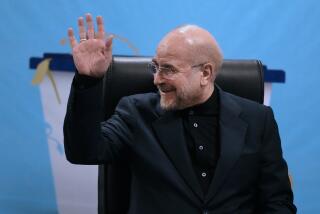Chalabi a Strategist Amid Frequent Setbacks
WASHINGTON — An arrest warrant for Ahmad Chalabi is the latest turn in the unlikely saga of a figure who is skilled at winning support from those in power.
For years Washington’s favorite Iraqi exile, the 59-year-old financier fell from favor with the Bush administration several months ago as their goals for Iraq collided. Yet he still has supporters among American conservatives, and those who know him say that despite his battles with Iraqi rivals and the Americans, they believe he expects to amass power and wealth in the new Iraq.
Born in Baghdad to an affluent banking family, Chalabi became well known in the United States after the 1991 Persian Gulf War, when he helped establish the Iraqi National Congress, an exile organization dedicated to the overthrow of Saddam Hussein.
Educated at the Massachusetts Institute of Technology and the University of Chicago, Chalabi won the admiration of American lawmakers, neoconservative activists and prominent journalists as he prodded the U.S. government to oust Hussein, rather than try to contain him. His supporters, including top civilians in the administration’s Defense Department, called him a patriot with a passion for democracy and the free-market system that they believed could transform Iraq into a keystone in the modernization of a threatening region.
But Chalabi also had strong detractors in the U.S. government and alienated many officials in the CIA and the State Department. Critics often brought up his 1992 conviction for embezzlement, fraud and breach of trust in the collapse of Jordan’s Petra Bank, which he founded and ran. The Jordanian government lost several hundred million dollars; Chalabi was convicted in absentia and sentenced to 22 years in prison.
On April 6, 2003, barely two weeks after the U.S. attack on Iraq began, the Bush administration showed its faith in Chalabi by airlifting him and several hundred armed supporters into Iraq. When the U.S.-led coalition formed an interim government, Chalabi was named to the Iraqi Governing Council, serving for a time as its president.
He also helped to revamp Iraq’s financial sector and was made head of the committee supervising “de-Baathification,” the purging of members of Hussein’s political party from government. In that post, he had enormous influence over who could, and could not, get a job in the state-controlled economy.
When Chalabi visited Washington in January, he got the full VIP treatment, including a seat with First Lady Laura Bush at the president’s State of the Union address and a kiss on both cheeks from Secretary of State Colin L. Powell.
Yet on the Governing Council, Chalabi continued a long-running rivalry with Iyad Allawi, now Iraq’s interim prime minister. The two men, who battled for years as exiles, disagreed over de-Baathification, since Allawi believed that skilled members of the former regime needed to be drawn into the new society.
And this year, as it became apparent that some of the prewar intelligence provided by the Iraqi National Congress had been misleading, inflated or even fabricated, the group lost its $340,000 monthly stipend from the U.S. government.
As he looked to build a base of support, Chalabi made some contacts that alarmed the U.S. administrator of Iraq, L. Paul Bremer III, and other Americans. Although not known for his religious piety, he reached out to his fellow Shiite Muslims, in part because he had alienated the Sunni and Kurdish populations. He cultivated officials in the government of Iran, a country the Bush administration considers part of the “axis of evil.”
In trying to build support among the Shiites, he has allied himself with Muqtada Sadr, the radical cleric who has mobilized impoverished young Iraqis against U.S.-led troops.
Some analysts say that even after a year in high-profile positions, Chalabi has little chance of winning support in the cycle of elections that is to begin in January. Yet some officials believe he may be able to negotiate and buy support.
All this makes him a wild card in Iraqi politics. Experts speculated Sunday that officials in the interim government may have decided that they wanted to damage Chalabi’s standing.
“Chalabi has become a nuisance, and they want to sideline him,” said Henri J. Barkey, a Mideast expert and former State Department official. “I think this is designed to undermine his credibility ... and ultimately I think it’s going to have an impact.”
Phebe Marr, another Iraq expert in Washington, said that although she had no knowledge of the charges, “it reflects a deep-seated struggle for power in Baghdad.... There’s no love lost between Allawi and the Chalabis.”
The authorities showed their unhappiness with Chalabi in May, when they sent Iraqi police, backed by U.S. forces, to raid his house and the Iraqi National Congress compound, seizing documents and computers and looking for information on some of his associates.
The raid occurred amid news reports that U.S. intelligence agencies believed Chalabi had passed classified information about the occupation to Iran.
More to Read
Sign up for Essential California
The most important California stories and recommendations in your inbox every morning.
You may occasionally receive promotional content from the Los Angeles Times.











